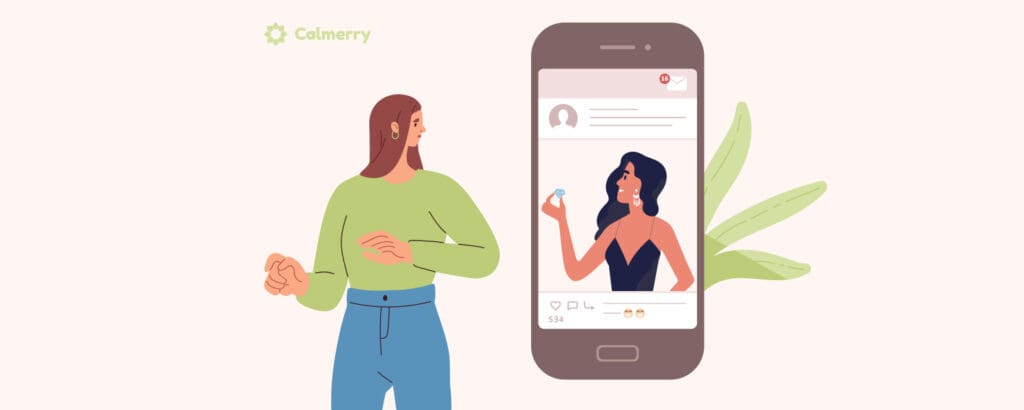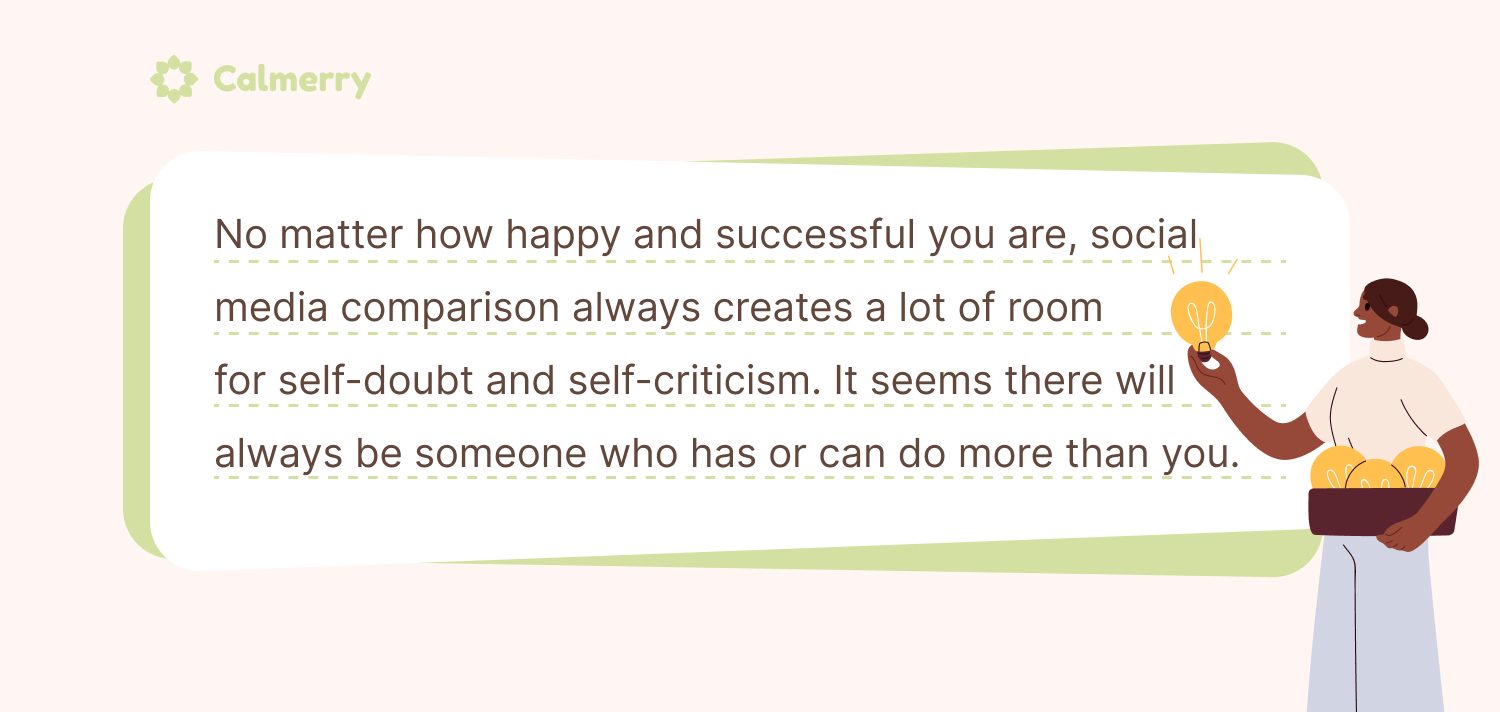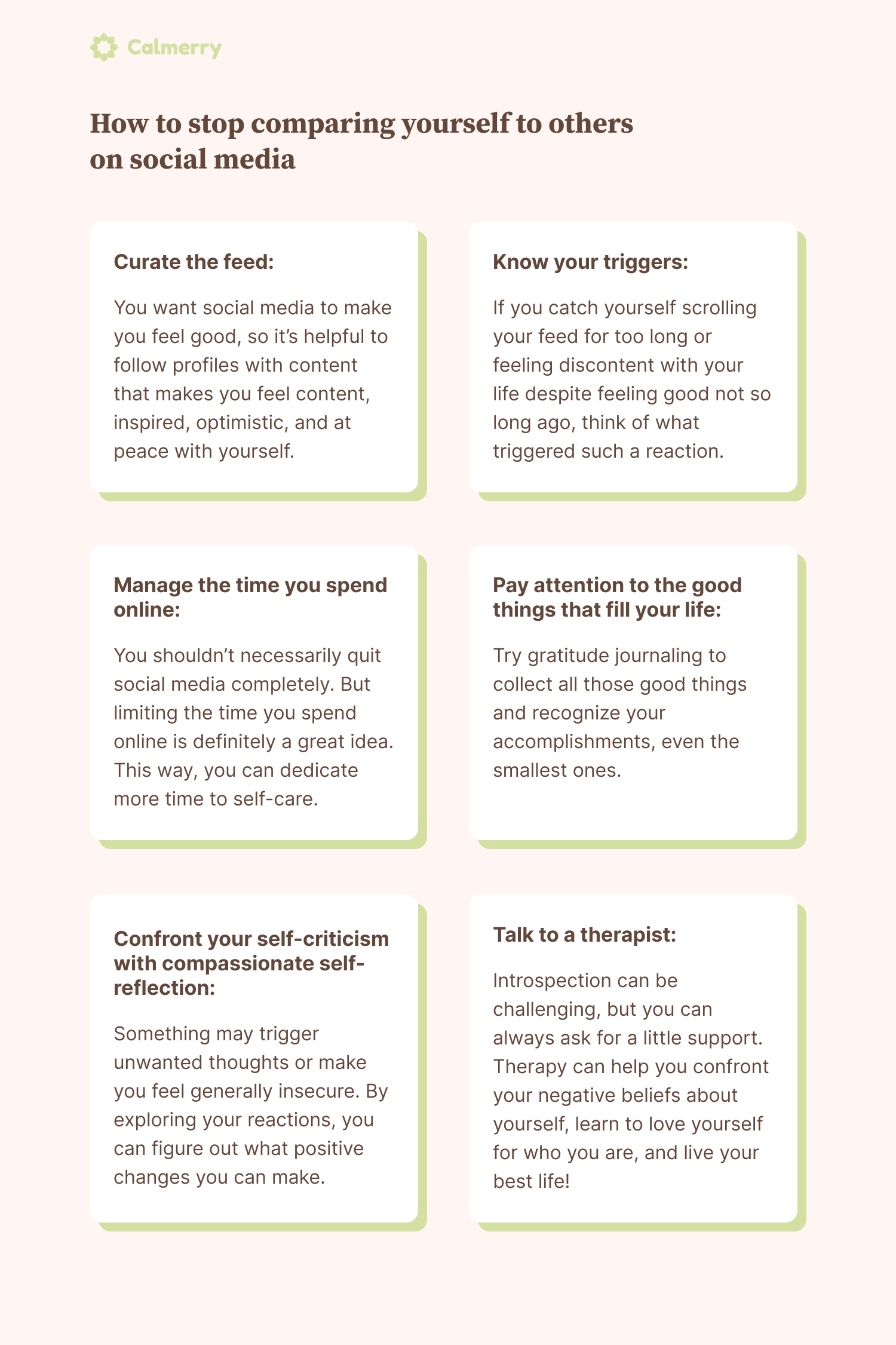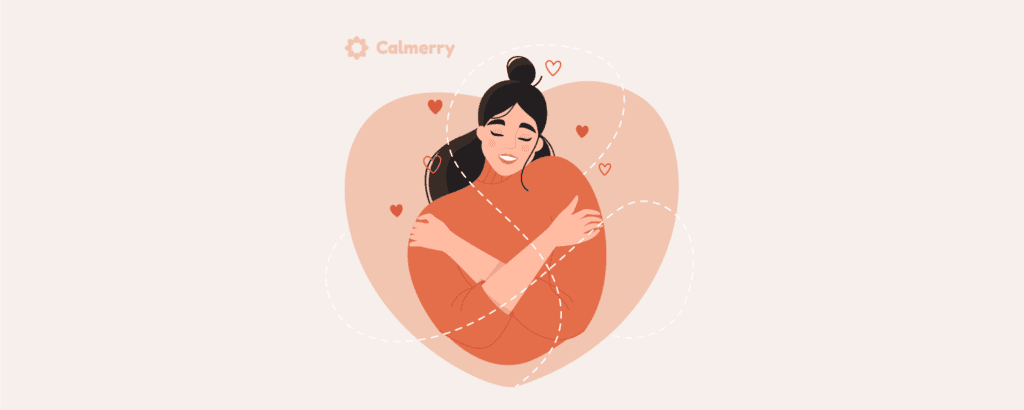How to Stop Comparing Yourself to Others on Social Media?

In this article
What do you think of the people you follow on social media? Do you compare yourself to them every once in a while? When we follow someone online, we can get a glimpse into every corner of their life. We see how they have fun, work out, travel, work, and spend time with their families.
And if you think about it, that’s a lot of information to know about the other person. We all follow those we know personally, but most don’t limit ourselves to friends and relatives.
There are thousands of social media influencers living their best lives who broadcast their success 24/7. And when you’re not missing any updates, you may inevitably start comparing yourself to others on social media.
So, why is social media comparison bad? Well, in short, it can impact your mental health and self-esteem, in particular. Let’s think of why we compare ourselves to others, in the first place.
Swings and roundabouts: Why do we tend to social media comparison?
Why compare? People are social creatures, and we crave social interaction. We have been comparing ourselves to others since the stone age, so the social comparison is rather inevitable. It’s not something that appeared with the invention of social media but social media definitely took it to a whole new level.

Social media introduces a wide range of measurable interactions, including likes, replies, reactions, and even just views. And the amount of these interactions can make a certain contribution to one’s social status or even be monetized.
That’s why social media and comparison became virtually inseparable. And that’s one of the reasons why so few people share their problems and struggles online. In contrast, when you visit someone’s profile, you are likely to see a well-curated selection of their perfect moments.
The problem is, right after posting your own photo or video of you having a good time, you may see hundreds of other people’s posts and realize they seem to have it so much better.
No matter how happy and successful you are, social media comparison always creates a lot of room for self-doubt and self-criticism. It seems there will always be someone who has or can do more than you.
Consequences of social media comparison
Research data shows that many people who use social media believe that others are happier. Besides, researchers have found a clear connection between social media comparison and common mental health problems such as depression and anxiety.
Excessive social media use has been linked to:
- Sleep problems
- Negative body image
- Detachment from your authentic self
- Various toxic and energy-draining habits
- And cyberbullying
Not surprisingly, there is also a strong connection between low self-esteem and social media.
Social media, in general, has proven to have negative consequences for mental health, which is a reason why many medical experts recommend that parents manage their children’s social media use.
Social media comparison trap
One of the main ways in which social media consumption can be self-destructive is that it cultivates social comparison. And, being a social species, we use it as one of the key sources of our perception of self.
According to the theory of social comparison, most people tend to make downward social comparisons. In other words, we usually choose to compare ourselves to those who have it worse than us. While being able to feel compassion, we may still feel better about ourselves and appreciate our lives more.
The situation flips when we make upward comparisons. In this case, your self-esteem may take the damage. And the negative thing about social media is that it creates way too many opportunities for upward comparisons.
And the more connections you have, the more likely you will engage in upward comparison. Research data from the pre-internet era suggested that:
- The average person had up to 150 social relationships, in general – only 10 to 20 of which were relatively close.
- Modern people, however, have, on average, 338 online friends.
Me vs. myself
According to the self-discrepancy theory, there are three types of self-representation:
- Actual self, or who you actually are
- Ought self, or who you think you should be in society
- Ideal self, or who you want to be
These three kinds of self are usually quite different, and when we spot the differences, we may experience strong emotions, including anger, sadness, and frustration.
That’s where social media comparison can be dangerous in two ways:
First, it may remind us of the difference between the actual and ideal self. While such a comparison can sometimes be a strong driver for self-improvement, it may also cause the unpleasant emotions listed above.
Secondly, successful influencers who broadcast their luxurious life may distort our perception of the ought self, making us compare ourselves to the standards unattainable for the majority of people.
How to stop comparing yourself to others on social media
So, what can you do to escape this vicious circle of social media comparison if you start feeling its destructive impact on your mental health? Should you just quit social media completely? Not necessarily.
Here are some tips that might help you:

1. Curate the feed
If someone on your feed, for any reason, makes you feel uncomfortable, there’s nothing wrong with unfollowing them. Even if it’s someone you know personally, don’t worry about upsetting them – think of your mental health first.
If that’s an influencer, you most likely will lose nothing. And if you know them – you can always talk to someone in person and explain that it’s not about them. On Instagram, you may also mute someone while still staying on their list of followers. In any case, unfollowing is better than filling your mind with jealousy, envy, sadness, or anger.
You want social media to make you feel good, so it’s helpful to follow profiles with content that makes you feel content, inspired, optimistic, and at peace with yourself. Some may even help you on your journey to healing. Still, it’s also important to remember that social media is not therapy.
2. Know your triggers
Pay attention to the situations that make you start comparing yourself to others on social media. You may engage in comparison after seeing content from certain people or performing certain activities. For instance, one of the most problematic things associated with social media is doomscrolling.
If you catch yourself scrolling your feed for too long, experiencing negative emotions, or feeling discontent with your life despite feeling good not so long ago, think of what triggered such a reaction. By knowing your triggers, you can easily decide what content to avoid.
3. Limit the time you spend online
Social media can be quite addictive. In fact, developers of social media platforms aim to make their products as engaging as possible, pushing users to interact with the platforms more and more frequently.
Unfortunately, all the engaging features of social media also make them addictive. You need to learn to cope with this type of behavioral addiction for the sake of your well-being, especially if you’ve already started to feel the negative emotional impact.
Although you shouldn’t necessarily quit social media completely, limiting the time you spend online is definitely a great idea. This way, you can dedicate more time to self-care.
Try some of the many mindfulness practices, repeat positive affirmations, or do anything that brings you joy instead.
4. Appreciate the good things in your life
When constantly exposed to other people’s success online, it can be easy to forget about all the good things you have in your life. Try gratitude journaling and make sure to recognize your accomplishments, even the smallest ones.
Think of what you can be proud of and practice self-compassion to learn to love yourself.
5. Confront your self-criticism with compassionate self-reflection
Think of why some content makes you feel bad about yourself or dissatisfied with your life. For instance, something may trigger unwanted thoughts or make you feel generally insecure. By exploring your reactions, you can determine self-improvement directions and figure out what positive changes you can make.
While being extremely helpful, self-reflection is never easy. Fortunately, you don’t need to embark on this path alone.
A licensed therapist can help you better understand yourself and suggest effective practices so that you can overcome the common consequences of social media comparison, including:
- Stress
- Depression
- Social anxiety
- Low self-esteem
- Feeling of loneliness
- Or even eating disorders
Breaking out social media comparison trap with therapy
Social media comparison can have a significant negative impact on your self-esteem and mental health in general. But you can break this vicious circle by carefully selecting the content that you consume, paying attention to common triggers, and doing some introspective work.
Introspection can be challenging, but you can always ask for a little help. Therapy for self-esteem can help you confront your negative beliefs about yourself and learn to love yourself for who you are.
If you don’t have much time to visit a therapist in person, online therapy platforms like Calmerry can help you access mental health professionals from the comfort of your home. You can overcome the negative consequences of social media comparison, learn to love yourself, and start living your best life.
online therapy
live video session




